Vladyslav Rudenko was only 16 years old when three balaclava-wearing Russian soldiers armed with machine guns forced themselves into his home in southern Ukraine and snatched him away.
It was October 2022, and Russian forces had been occupying the city of Kherson since early March – one week into Vladimir Putin‘s invasion of Ukraine.
Vladyslav was given 30 minutes to pack up his belongings before he was forcefully enrolled into a military camp that aimed to strip him of his Ukrainian identity and mould him into an obedient Russian soldier.
For the next nine months, the teenager was barred from contacting his family, subjected to sadistic physical abuse, and forced into a Russian uniform as part of Moscow‘s systematic attempt to indoctrinate Ukrainian minors.
Speaking in the wake of his trauma, he told the Daily Mail: ‘On one day, Russia took everything away from me and my life was never the same again.’
Vladyslav is one of almost 20,000 other children who, since the start of the war, have been kidnapped from their homes and transferred to Russian-occupied areas of Ukraine or to Russia and its ally, Belarus, for militarisation and re-education.
He was first relocated to a health spa in the seaside city of Yevpatoria, in Russia-occupied western Crimea, which had been repurposed into a training centre for Ukrainian minors to absorb pro-Kremlin propaganda.
Before long, he was sent to a naval military academy in the rural village of Lazurne in the Kherson region, where Ukrainian teenagers learnt how to assemble and dissemble a gun, shoot with precision, and took turns standing guard at checkpoints.
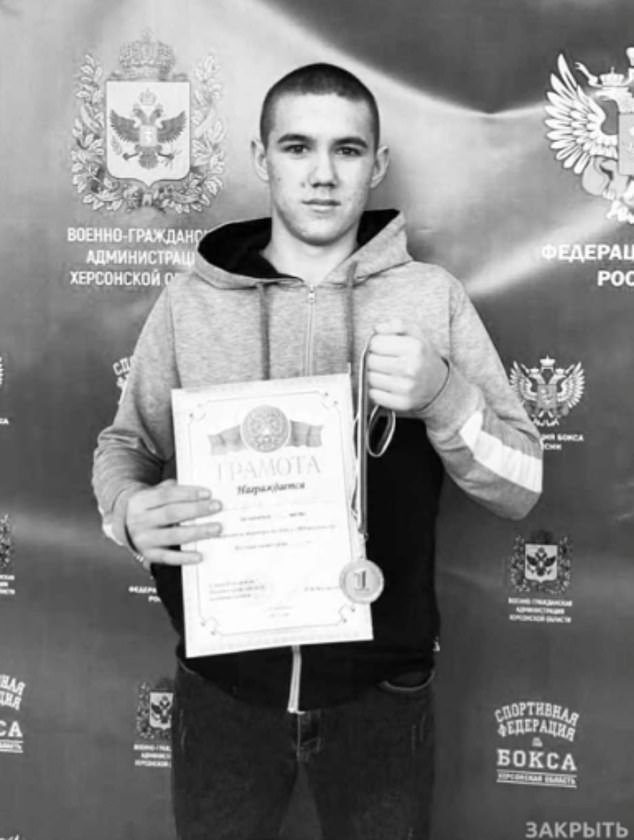
Vladyslav Rudenko was only 16 years old when three balaclava-wearing Russian soldiers armed with machine guns forced themselves into his home in southern Ukraine and snatched him away
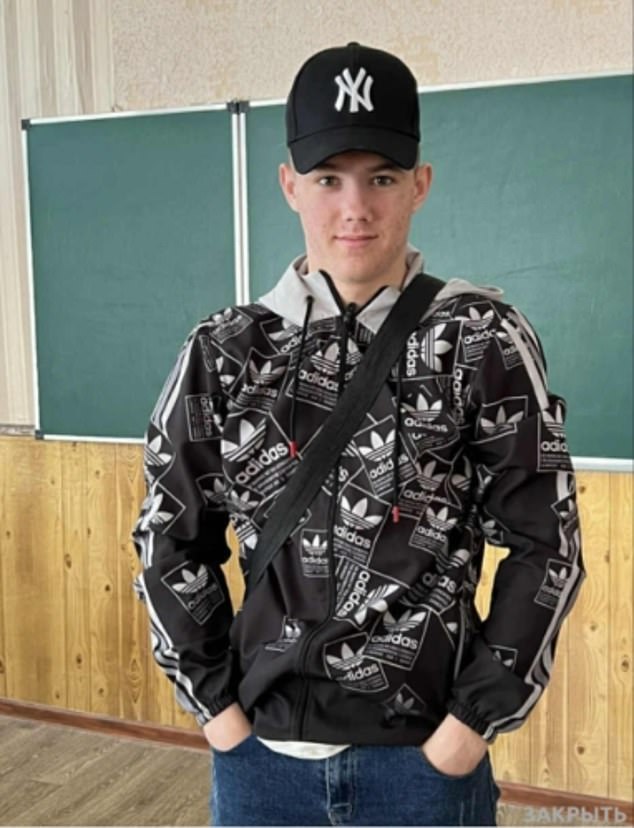
He was given 30 minutes to pack up his belongings before he was forcefully enrolled into a military camp that aimed to strip him of his Ukrainian identity
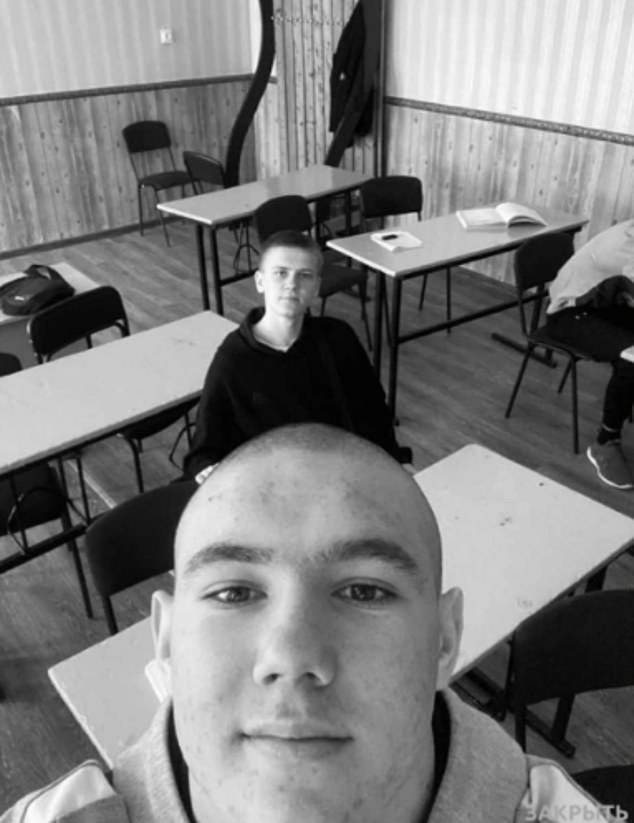
Once he arrived at camp, Kremlin officials were constantly trying to get Vladyslav to accept Russian citizenship and a Russian passport, in a bid to strip him of his nationhood.
Highly athletic, a keen boxer and on track to become a sailor, Vladyslav led a good life in Ukraine, until one day his mother woke him up and told him the war had begun.
‘I said: “You’re joking.” And she said: “Look for yourself.” I went to the balcony and saw missiles attacking the aerodrome and then I realised that the war has indeed started.’
His life turned upside down even further months later when Russian soldiers arrived at his door and took him away on the pretense that he was going on ‘vacation’.
But once he arrived at camp, Kremlin officials were constantly trying to get Vladyslav to accept Russian citizenship and a Russian passport, in a bid to strip him of his nationhood.
‘They wanted me to be a Russian, a Russian solider, but since Russia didn’t give me anything but destroy my childhood and separate me from my family, that was not an option for me,’ he says defiantly.
‘First, we woke up to the Russian national anthem. Then we raised the Russian flag. After breakfast, we had an hour of education about what had happened during the evening in Russia. Then we were taken to a cinema to watch Russian films.’
Describing what it felt like being stuck in the ‘pro-Russian machine’, he says it was ‘a vicious cycle where nothing changes’.
As part of the indoctrination, the teenagers were forced into doing military drills while wearing the St. George’s ribbon, a Russian nationalist symbol.
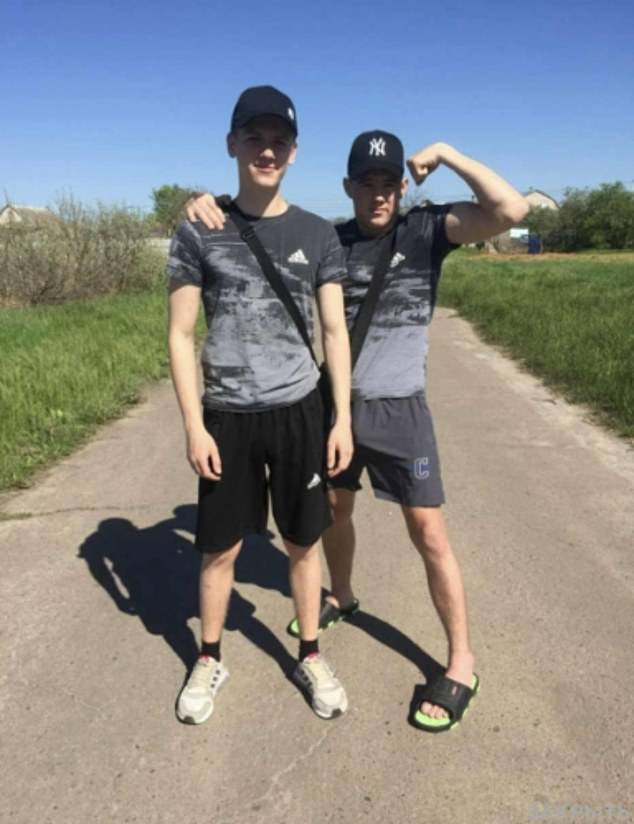
Vladyslav was once punished by being locked up in solitary confinement in a six-square-metre room for a week and forbidden from talking to anybody
During his time trapped in the camp, he tried to resist the pro-Kremlin propaganda by pulling down a Russian flag from a flagpole and replacing it with his underwear.
As punishment, Vladyslav was locked up in solitary confinement in a six-square-metre room with barred windows for a week and forbidden from talking to anybody.
He admitted that during this time he began to have suicidal thoughts.
Soon, the doctors stationed at the camp started to prescribe him up to eight pills a day, telling him they were tranquilizers to calm him down while the teenager was shouting at the guards to let him go. Distrustful of authority, Vladyslav always flushed the drugs away.
Children in the camps were subjected to a range of sinister punishments, such as being deprived of food, being threatened with straitjackets and electric shocks, and being ordered to clean the entire site.
Throughout his time interned, he was banned from speaking to his family, and his phone was constantly monitored by the guards.
He was told not to speak or write in Ukrainian, to delete all Ukrainian phone numbers, and erase all photos connected with his home country.
At one point, the commissioner showed Vladyslav a photo of his father in military uniform and stressed that he must never contact him, ordering the teenager to wipe his phone.
One particularly disturbing incident occurred when Vladyslav lived in the same room as another boy, whose mother had arrived to take him home to Ukraine.
Before he left, the boy asked Vladyslav to give him a henna tattoo, but later some of the Russian guards noticed it during a search for tattoos containing Ukrainian symbols.
As punishment, Vladyslav’s roommate and his mother were taken into a room with a Russian flag, forced to strip down to their underwear, and record a video apologising for their tattoos.
Even when the charity Save Ukraine managed to organise the successful return of Vladyslav alongside 21 other children during one of the organisation’s rescue missions, his journey home was far from easy.
Armed FSB agents sat him down in a car and threatened him not to tell anyone about what he witnessed during his time in the Russian camps, warning Vladyslav that they knew the location of his father.
The agents then forced him to record a video saying he was pro-Russian before he was finally allowed to cross the Belarus border.
His mother was also subjected to severe cruelty, including being put through a humiliating lie-detector test and being forced to wear a stink bag over her head when she came to return her son.
But Vladyslav, now 18 and safe in Ukraine, has high hopes for the future. Still a keen sportsman, he plans to move abroad to join an athletic school, launch his own sports clothes brand and open a boxing arena.
‘So that people can have a hobby, and learn how to stand up for themselves and protect their dignity and worth,’ he says proudly.
Kseniia Koldin, now 21, is another Ukrainian who had her life dramatically upended by Putin’s mass indoctrination campaign.
She was finishing grade 11 in Vovchansk, northeastern Ukraine, when Moscow launched its full-scale invasion in February 2022.
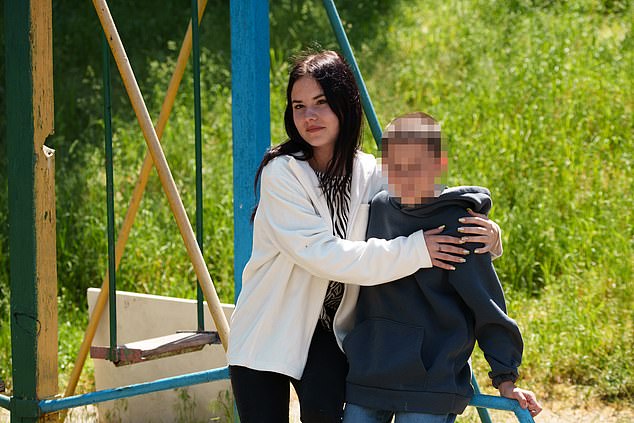
Kseniia Koldin and her brother Serhii were taken to Russia and separated from their home in Vovchansk, northeastern Ukraine
She and her brother Serhii, then 11, had been living in a Ukrainian foster family after their parents lost custody of them two years earlier.
But when the city fell into the hands of Putin’s occupation, the siblings’ foster parents obliged with the local authorities and sent the pair to Russia.
In August, Serhii was transferred to the ‘Medvezhonok’ children’s camp in Krasnodar Krai, while Kseniia was forced to attend a state-run trade school in Shebekino, in the Belgorod region.
The two were forcefully separated by more than 1,500 kilometres for nine months as they became victims of the Kremlin’s mission to indoctrinate Ukrainian children into Russian society.
About her time in the college, where she was forced to speak Russian and strip herself of any symbols of her nationality, Kseniia told the Daily Mail: ‘There was a lot of Russian propaganda. We were forced to sing the Russian anthem and teachers told me I had to learn it by heart.
‘On Mondays, they would lift a big Russian flag in a ceremony. After that, we had a lesson called ‘Conversations about Important Things’ which were basically propaganda lessons.
‘All we learnt was how great Russia is, how wonderful it is, like a paradise on earth.’
Sometimes, Kseniia was taught by the school’s deputy principal, who would often stop the lessons midway through and launch into a lecture about how if Russia hadn’t attacked Ukraine, Ukraine would have attacked first.
They were taught pro-Kremlin myths, including the lies that Ukraine is conspiring against the West and that the country is full of Nazis.
After three months, the 18-year-old was kicked out of her dormitory after refusing to accept a Russian passport.
‘Teachers were pressuring me about it. They told me: “Look, you’re an orphan, you have the right to receive social benefits from the Russian government, you can get an apartment in Russia for free, and you can have a bright future here.”‘
When Ukrainian forces liberated Vovchansk, Kseniia managed to make it back home with the help of Save Ukraine.
She was determined to free her brother too, but he had already been placed with a Russian foster family and his personality began changing.
At first, he sent her desperate messages, begging his sister to bring him back. But his new parents managed to fill his mind with fear, insisting that Ukraine was in ruins, that he’d be killed there, and that Kseniia had abandoned him.
At Russian school, the 11-year-old was bullied and humiliated by teachers, who called all the Ukrainian children stupid and said they were incapable of learning.
Once, a man in military uniform came into school and showed the children how to assemble and dissemble an automatic rifle.
‘I think if my brother had stayed there, he most likely would have been sent to a military preparation camp and at some point he could have ended up fighting Ukrainians in the Russian army,’ she says.
Slowly, as much as she tried to contact him, Serhii stopped responding to Kseniia’s messages.
She went to Russia to save him anyway, but when she first reunited with him, he didn’t even hug her. Instead he stood on the spot frozen as if she was a stranger.
It took Kseniia three hours to convince him to leave Russia and return to Ukraine. ‘It was difficult to see how the propaganda grew over this period, and it was painful and hurtful to see how much they were able to change my brother,’ she says.
The two struck a compromise. She convinced him to come to Ukraine for only a month – and if he didn’t like it there, he could return to Russia. ‘I told him I loved him and missed him and that it was important for me to come back with him, because he’s the only family I have left,’ she says.
The pair returned to Ukraine in May 2023 and now live in Kyiv. Serhii, 14, is in school and about to be adopted by another foster family, and Kseniia is in her third year of university training to be a journalist.
While the trauma remains for both of them, Kseniia is now working for Save Ukraine and is writing a book about the stories of thousands of other Ukrainian ‘hostages’ snatched from their homes.
‘Russia’s plan in the occupied territories is to organise military drills for teenagers as young as 14 and 15 and teach them how to handle weapons, operate drones, and drive tanks,’ she says.
‘They are training boys in particular en masse to make them fight against their country. For girls, the plan is different. They want the girls to stay in Russia and deliver babies.’
For Kseniia, her mission is to facilitate the safe return of as many kidnapped Ukrainian children as possible, to stop the mass eradication of her national identity.
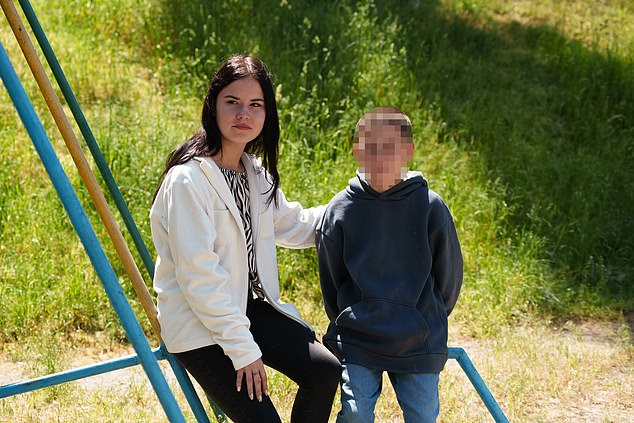
The two were forcefully separated by more than 1,500 kilometres for nine months as they became victims of the Kremlin’s mission to indoctrinate Ukrainian children into Russian society
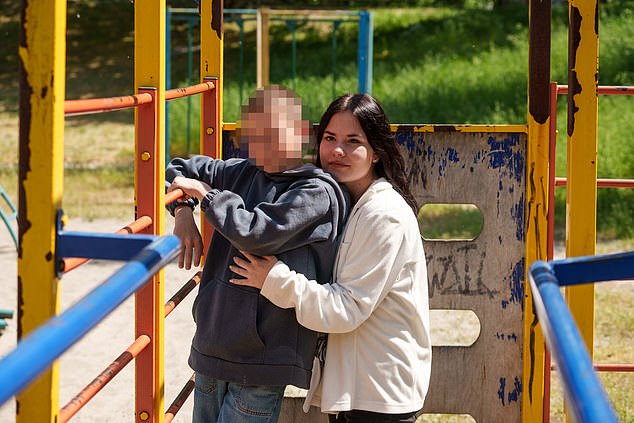
Kseniia helped to secure the safe return of her brother out of Russia with the help of Save Ukraine in May 2023 and now both of them live in Kyiv
Save Ukraine has organised the return of 846 children from Russia and Russian-occupied parts of Ukraine.
Ukrainian officials state that a total of about 1,600 children have returned home after being taken by Russia.
According to striking new research by the Yale Humanitarian Research Lab, thousands of children from Ukraine have been systematically relocated to at least 210 sites for military training, drone manufacturing and other forced re-education.
While Ukraine says Russia has illegally deported or forcibly displaced more than 19,500 children, Yale estimated that figure could be closer to 35,000.
In one case, Yale detailed children from the Donetsk region receiving ‘airborne training’, while others were forced into shooting and grenade throwing competitions.
A statement released by the office of Ukrainian President Volodymyr Zelensky said that ‘without the return of the children abducted by Russia, the war cannot truly be considered over’.
According to a new report by War Child UK, Save Ukraine and the Human Security Centre, based in 200 documented cases, 55 percent of kidnapped children were subjected to pro-Russian propaganda and bans on Ukrainian language and 41 percent were forced into weapons training or paramilitary youth groups.
The groups also heard cases of torture as well as sexual violence and described the Kremlin operation as ‘the largest organised campaign of child rights violations in Europe since the Yugoslav wars’.
One 16-year-old girl told researchers: ‘Every day felt like we were being shaped into something we weren’t… They wanted us to behave like their soldiers.’
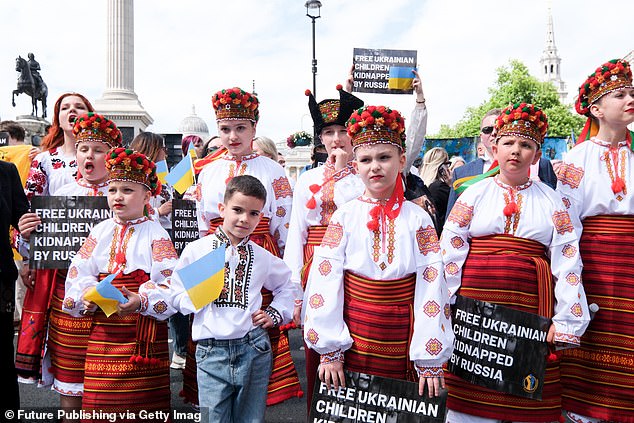
March in London for abducted Ukrainian children, June 2025
Earlier in September, the UK imposed new sanctions to target Russian officials and youth groups supporting Putin’s attempts to forcibly deport and indoctrinate Ukraine’s children and erase their cultural heritage.
The government said defence intelligence demonstrates that Russia is pursuing a long-standing Russification policy in illegally occupied territories of Ukraine, seeking to ‘eradicate Ukrainian identity and statehood’.
Some kidnapped children have been placed with Russian foster families or at boarding schools, and had their surnames changed to eliminate any trace of their past.
The re-education strategy dates back to Russia’s illegal annexation of Crimea more than 10 years ago, and now there are fears Putin is using the camps to train up a new generation of foot soldiers for his army.
Deputy Prime Minister David Lammy said: ‘The Kremlin’s policy of forced deportations, indoctrination and militarisation of Ukrainian children is despicable, and demonstrates the depths of depravity that President Putin will reach to erase Ukrainian language, culture and identity.
‘To take a child from their home and seek to forcibly erase their heritage and upbringing through lies and disinformation can never be tolerated. No child should ever be a pawn of war and that is why we are holding those responsible to account.’












